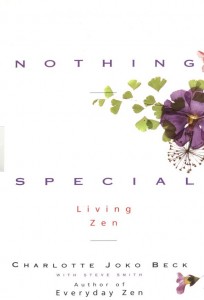“Practically speaking, a life that is vowed to simplicity, appropriate boldness, good humor, gratitude, unstinting work and play, and lots of walking brings us close to the actual existing world and its wholeness.”
– Gary Snyder, Beat Poet and Zen Practitioner
Practice Meetings
Tuesday Jul 24, 8:30am
Friday Jun 27, 7:00pm
This Week’s Reading
Thich Nhat Hanh, Old Path While Cloud, Chapter 4.
This Week’s Koan
Book of Serenity #64: “Zizhao’s ‘Succession'”
Head Monk Zizhao [a disciple of Changqing] asked Fayan, “You have opened a zendo, Master. But who did you succeed to?”
Fayan said, “Master Dizang.”
Zizhao said, “You have gone a great deal against your late master Changqing.” [Fayan had also practiced under Changqing.]
Fayan said, “I still don’t understand a turning word of Changqing’s.”
Zizhao said, “Why didn’t you ask me?”
Fayan said, “‘The one body manifests itself in myriad phenomena’, what does it mean?”
Zizhao stuck up his whisk.
Fayan said, “That is what you learned under Changqing. What is your own view, Head Monk?”
Zizhao was silent.
Fayan said, “When it is said, ‘The one body manifests itself in myriad phenomena’, are the myriad phenomena swept away or are they not?”
Zizhao said, “Not swept away.”
Fayan said, “There are two.”
All the disciples on the right and the left side said, “Swept away.”
Fayan said, “The one body manifests itself in myriad phenomena. Look!”
Comment:
Fayan (“Hogen” in Japanese), b. 885
15th Generation
Lineage: Shitou > Tianhuang > Longtan > Deshan > Xuefeng > Xuansha > Luohan > Fayan
Dharma Siblings: Jinshan Honglin, Xiushan Longji
Also appears in: Gateless Gate #26 (=BOS 27), Blue Cliff Record #7, Book of Serenity #17, 20, 51, 74
Zizhao (“Shisho” in Japanese) and Fayan had both been disciples of Changqing (“Chokei” in Japanese). Changqing, Baofu, Yunmen, and Xuansha (Fayan’s Dharma “grandfather”) were all Dharma “brothers” of each other — and Dharma “sons” of Xuefeng (“Seppo” in Japanese). Zizhao had stayed with Changqing. Fayan moved on to study under Dizang (a.k.a. Luohan; “Jizo” in Japanese).

